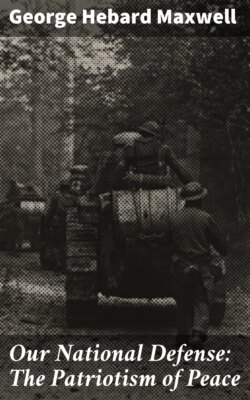Читать книгу Our National Defense: The Patriotism of Peace - George Hebard Maxwell - Страница 7
На сайте Литреса книга снята с продажи.
CHAPTER II
ОглавлениеTable of Contents
Advocates of Peace present no plan for national defense in case of war. They leave it to the Militarists to provide for that contingency. The Militarists have proposed no adequate plan for national defense. No plan has been evolved, other than that urged in this book, which would in all emergencies safeguard the nation against war, and at the same time be in sympathy with and strengthen every movement to promote peace.
To make this clear, the various schools of thought on the subject should be classified, and their views briefly outlined.
On the one hand we have the Militarists. They constantly clamor for a bigger navy and a larger army on the ground that we are unprepared for war—unarmed, unready, undefended—and that war is liable to occur at any time.
On the other hand we have the Passivists. They have the courage of their convictions. Believing in peace, they oppose war, and all the means whereby it is made. Having faith in moral influence, they oppose armaments. They are consistent, and urge that this nation should disarm and check military expenditures. In their peace propaganda before the people they have squarely and honestly contended for this national policy for which they deserve infinite credit.
In case of war, they have no plan.
They leave that to the Militarists.
Between these two extremes we have the Pacificists. They deplore war and talk for peace, but believe in building battleships. They argue for arbitration and advocate disarmament, but have not opposed steadily increasing appropriations for naval and military expenditures by the United States. They justify this position on the plea that the best guarantee against war is an army and navy. They oppose war but not appropriations for war. They hold peace conferences and pass peace resolutions, but do not go before the committees of Congress and object to expenditures for armaments and militarism. In this class belong all peace advocates who are builders of battleships or manufacturers of armor plate or armaments, and their associates.
This suggests the question whether such a manufacturer is a safe pilot for a peace movement, however generously it may be subsidized, and whether an armor-plate mill and a peace palace are appropriate trace-mates. It would be unfortunate if the subtle influence of subconscious self-interest should creep into peace councils or affect the policy of a peace movement. However that may be, the theory that armaments prevent war has been pretty well exploded by recent events.
The Pacificists, in case of war, have no plan of their own to propose.
They, too, leave that to the Militarists.
Then we have the Pacificators.
They advocate disarmament and a tribunal of peace in the nature of an international court to determine international differences and make binding decrees; and they propose the establishment of an international army and navy under the control of that court to enforce its decrees. Of course it must be conceded that this plan may fail, or its success be long delayed, and that in the meantime it affords no guarantee of peace.
The Pacificators, however, propose no plan in the event of war.
They also leave that to the Militarists.
Finally comes the Woman's Movement for Constructive Peace, out of which has grown the organization of the Woman's Peace Party.
Much may be hoped for from this organization if it will concentrate its strength, and not try to do too many things at once.
If the women of the world will unite and put the same militant force behind the peace movement that they have put behind the suffrage movement they can end wars. There is no doubt of that. But it will require world-wide organization, good generalship, and great concentration of effort. "One thing at a time" should be their motto.
The following platform was adopted by the Woman's Peace Party:
